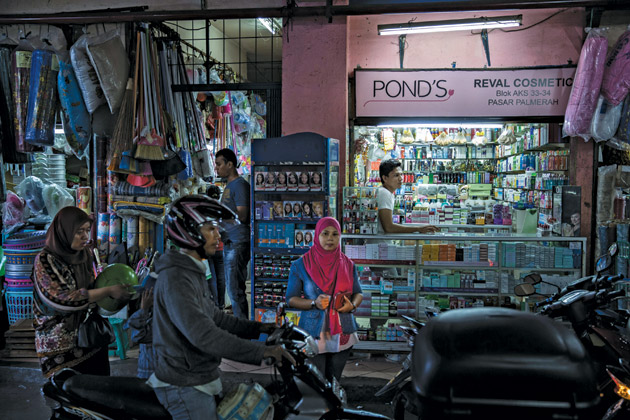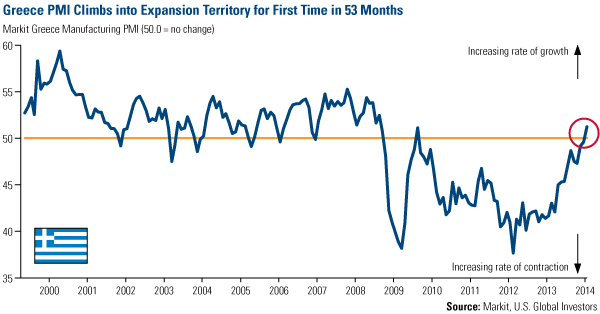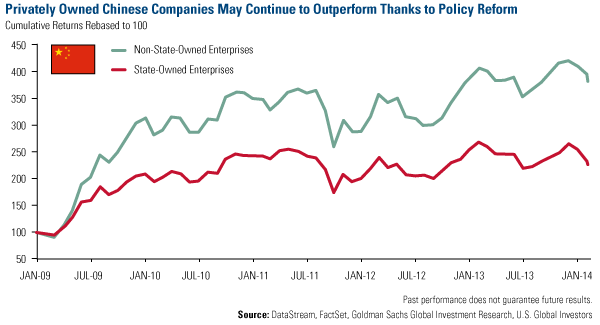Emerging Markets Radar (February 10, 2014)
Strengths
- Emerging market currencies rebounded strongly on Tuesday. Hedge funds and other speculative investors booked profits on recent bets against the currencies as they un-winded carry trades. The rebound originated when the Turkish central bank raised lending rates to banks to 10 percent. The spillover effect had 13 other emerging market currencies in our universe posting multi-sigma moves to the upside.
- Greece’s manufacturing sector expanded in January posting at 51.2, up from 49.6 in December, as measured by Markit’s Purchasing Managers’ Index (PMI). This was the first reading above 50 since August 2009, reflecting solid expansions in output levels and new orders, as production levels at Greek manufacturers rose for the third consecutive month. A slight rise in new export orders contributed to the improved performance, though data showed that it was the domestic market that provided the principal boost.
- Indonesia’s GDP expanded faster than expected at 5.7 percent year-over-year in the fourth quarter, recovering from 5.6 percent in the third quarter, as a weaker Indonesian rupiah drove a positive contribution to growth from higher net exports. Trade balance returned to a surplus of $2.3 billion in the fourth quarter from a deficit of $3.1 billion in the third quarter.
Weaknesses
- Hungary's industrial output growth slowed in December after accelerating for three consecutive months. Industrial output grew by 4.4 percent year-on-year in December, lower than the forecast of 6.2 percent. On a monthly basis, industrial output was down 1.9 percent.
- Despite a strong performance in 2013 from Czech and Hungarian exporters, the official trade numbers for the month of December were much less rosy. Hungary's trade surplus declined sharply to EUR 289.8 million (euro) in December from EUR 825 million in November, while the Czech Republic’s trade surplus declined sharply to EUR 9.6 billion in December from EUR 36.4 billion in November.
- Growth of Macau’s gross gaming revenue slowed to 7 percent year-over-year in January from 18.5 percent in December, reflecting a deceleration of casino traffic one week ahead of the Chinese New Year. Gaming stocks exhibited higher than normal volatility as a result.
Opportunities
- A recent correction in Hong Kong-traded Chinese equities, induced by slowing manufacturing activities and trust product default fears, may have created an opportunity to accumulate innovation-driven, well-managed internet companies in China founded by inventive entrepreneurs. Privately owned companies as a whole have outperformed state-owned counterparts in China, post-global financial crisis, and may sustain outperformance given reform-oriented government policy incentivizing innovation.
- Eurozone business activity strengthened again, as the composite PMI rose to 52.9 in January from 52.1 in December, and the services print edged up to 51.6 from 51. In peripheral Europe, Spain's composite PMI hit a six-and-a-half year peak of 54.8, while Italy is also returning to growth and France's business sector is showing signs of stabilizing, according to Markit.
- Christopher Wood of CLSA offered an interesting perspective on this year’s “turmoil” in emerging markets. In his Greed & Fear report, Wood notes that the negative market action in emerging market debt and currencies is now much more concentrated in those countries which have high U.S. dollar indebtedness. He adds that blanket generalizations about “emerging markets” ignore the reality that some countries have decent fundamentals and some do not. It is more of a country-specific issue that an asset class issue.
Threats
- Dedicated emerging market funds have set a record of 15-straight weeks of outflows, with cumulative outflows of $33.3 billion, equivalent to 4.4 percent of assets under management. The previous record of 14-straight weeks of outflows occurred in 2002. This week’s outflow of $6.36 billion was large, similar to last week’s outflow of $6.33 billion. The outflows combined from these two weeks are the largest since January 2008.
- Greek banks are likely to need additional capital after results of a health check are finalized. According to the country's central bank, this could threaten government plans to reduce its own funding gap. Banks rallied this week however, as a review by Blackrock is expected to show that the funding shortfall will have a more limited impact to the institutions.
- Returning fears of emerging market currency turmoil from Latin America and Eastern Europe could trigger sell-offs in outperforming Asian equities in order to meet redemption needs of global emerging market fund managers.














